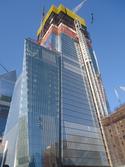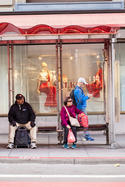The recent tragic events in Houston and across the Gulf Coast once again demonstrated the woeful inadequacy of our infrastructure. Hopefully, some good will come of Hurricane Harvey. Hopefully, it will jump-start the long-awaited Trump initiative on infrastructure, which may be the one issue that could unite this country. read more »
Transportation
Spotlight on Infrastructure After Harvey
- Login to post comments
The Changing World of Aviation
Perhaps nothing more illustrates the shifts in the global economy than the geography of the largest airports. In 2000, world air passenger statistics were dominated by high income world economies. Among the 25 busiest passenger airports, 14 were in the United States, five in Europe and five in Asia and one in Canada, according to data from the Airports Council International and the Port Authority of New York and New Jersey. read more »
- Login to post comments
The Great Transit Rip-Off
Over the past decade, there has been a growing fixation among planners and developers alike for a return to the last century’s monocentric cities served by large-scale train systems. And, to be sure, in a handful of older urban regions, mass transit continues to play an important — and even vital — role in getting commuters to downtown jobs. Overall, a remarkable 40 percent of all transit commuting in the United States takes place in the New York metropolitan area — and just six municipalities make up 55 percent of all transit commuting destinations. read more »
- Login to post comments
A Roadmap to Job-Creating Transportation Infrastructure: Doing the Right Things Right
There is broad public concern about the status of transportation infrastructure in the United States. On election night the future President said, "We are going to fix our inner cities and rebuild our highways, bridges, tunnels, airports, schools, hospitals." This report (“A Roadmap to Job-Creating Transportation Infrastructure: Doing the Right Things Right”) examines the condition of the nation’s infrastructure and makes recommendations to improve federal efforts in supporting ground transport. read more »
- Login to post comments
Why Rail Transit Doesn't Work in Atlanta
One of the more interesting presentations at the 2017 American Dream conference was by Alain Bertaud, a French demographer currently working at New York University. He has compared urban areas all over the world to see how transportation has influenced the layout of those areas. read more »
- Login to post comments
By Chinatown Bus to New York
I have long heard of the “Chinatown” buses that ply between Washington and New York. I recently planned a quick trip from Washington, both to try a Chinatown bus and to visit Manhattan. This would be my first intercity bus trip in decades, duplicating my first trip to New York (from Washington), just before college. That time, Trailways delivered me on an overnight schedule to the Port Authority Bus Terminal, just beyond the end of the Lincoln Tunnel. It was very exciting then, as now, just as any visit to Manhattan must be for anyone who enjoys cities. read more »
- Login to post comments
Will Donald Trump Expose America’s Great Mass Transit Hoax?
Whatever you think of President Trump, his claims about the lousy condition of America’s basic infrastructure are widely accepted—even by resisting Democrats grinding their teeth on a L.A. freeway or waiting for a New York or D.C. train to arrive. His call for a trillion-dollar infrastructure plan may be his last best bet for finding bipartisan support. read more »
First Mile-Last Mile, Intermodialism, and Making Public Transit More Attractive
In the ever-trendy world of transportation planning people seem to be infatuated with discussions of first mile-last mile public transportation connections and intermodalism. Given all the attention, one would think that the traveling public is anxiously awaiting their next opportunity to transfer vehicles to complete their trip. Nothing can be further from the truth. People don't aspire to transfer; they don’t aspire to experience an intermodal terminal. They almost always want to get door to door in the fastest, simplest, and most reliable fashion. read more »
A Reporter Rode Denver’s Airport Light Rail–And You Won’t Believe What Happened Next
Here’s a heartwarming story of a man who rode Denver’s airport light rail once, and it worked for him, so now he wants everyone in his Virginia city to pay higher taxes to build light rail to the local airport in case he might want to ride it again someday. How thoughtful and touching. read more »
Increase in Long Commutes Indicates More Residential Dispersion
A recent New York Times story chronicled the experiences of “extreme commuters,” those who travel two hours or more each way to work. The article focuses on people who commute to New York and notes that there is little or no data on extreme commutes. The Census Bureau, through the American Community Survey (ACS) does not survey two hour commutes. Its maximum classification is 90 minutes or more, though The Times focuses on the 60 minutes and over data, 2013 ACS. read more »
- Login to post comments


















